Promoting equality and diversity in healthcare is essential to providing high-quality care that is fair, inclusive, and tailored to the needs of all individuals. Health professionals, including doctors, nurses, therapists, and administrative staff, play a vital role in fostering an environment that values diversity and eliminates discrimination. This article explores the ways health professionals promote equality and diversity, the challenges they face, and the strategies used to create inclusive healthcare systems.
What Are Equality and Diversity in Healthcare?
Equality refers to providing every individual with the same opportunities and rights to access healthcare, regardless of their background, race, gender, age, or other characteristics. It focuses on fairness, ensuring that no group faces discrimination or disadvantage.
Diversity refers to recognizing, respecting, and valuing the differences among people. In healthcare, it means being aware of cultural, ethnic, gender, and other differences while adapting services to meet the needs of a diverse population.
Together, equality and diversity are cornerstones of a fair healthcare system where everyone can access the care they need without prejudice.
1. Providing Equal Access to Healthcare
Health professionals work to ensure that everyone, regardless of their socioeconomic status, cultural background, or physical ability, has equal access to healthcare services.
- Removing Barriers: Health professionals identify and address barriers that might prevent certain groups from accessing care, such as language barriers, lack of transportation, or financial constraints.
- Adapting Services: Facilities implement services like translation support, telehealth options, and financial aid programs to improve accessibility.
- Health Literacy: Doctors and nurses promote health literacy by providing clear, understandable information so patients can make informed decisions about their care.
For example, in a multicultural society, health professionals may use interpreters to communicate with non-native speakers, ensuring that language differences do not impact access to care.

2. Promoting Inclusive and Culturally Competent Care
Cultural competence is a critical part of promoting equality and diversity. Health professionals are trained to understand cultural differences, beliefs, and practices that may impact healthcare delivery.
- Cultural Awareness: Professionals educate themselves on the cultural, religious, and social values of the populations they serve.
- Respect for Traditions: In practice, they accommodate cultural needs, such as dietary preferences, religious practices, or modesty concerns, during treatment.
- Diverse Representation: Healthcare institutions work toward ensuring their staff represents the communities they serve, which builds trust and reduces inequalities.
For instance, a healthcare provider might offer private areas for Muslim women who require modesty during examinations, or they might respect dietary restrictions for patients observing religious practices.

3. Training and Education on Equality and Diversity
Health professionals undergo ongoing training to build awareness and competence in promoting equality and diversity.
- Diversity Training: Hospitals and clinics implement training programs on unconscious bias, cultural sensitivity, and inclusive care.
- Regulatory Standards: Professional bodies, such as nursing and medical councils, mandate that healthcare workers uphold equality and anti-discrimination principles.
- Personal Development: Health professionals continually update their knowledge to better understand the evolving needs of diverse populations.
By addressing unconscious biases, health professionals can provide fair treatment to all patients, regardless of race, ethnicity, gender, or socioeconomic background.
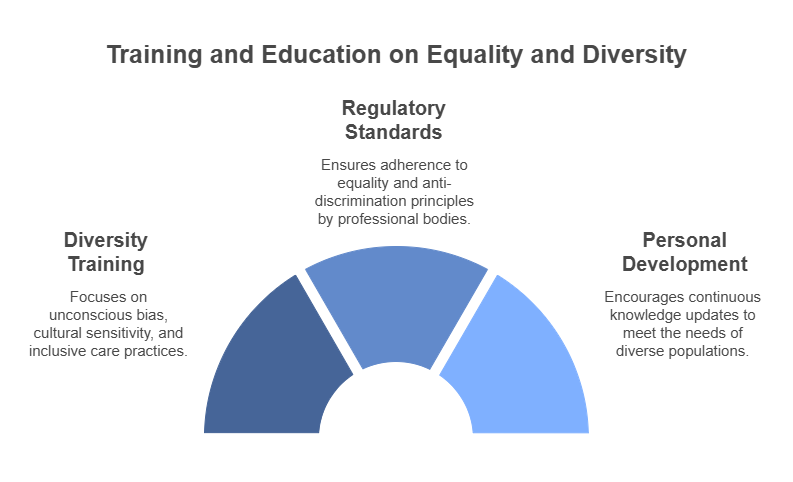
4. Addressing Health Inequalities
Health professionals play an active role in identifying and addressing health inequalities that disproportionately affect certain groups.
- Recognizing Disparities: Healthcare providers analyze data to identify health disparities in their communities.
- Targeted Outreach: Professionals implement health campaigns to target underserved or marginalized groups, such as vaccination drives in low-income neighborhoods.
- Community Collaboration: Working with local organizations, health professionals can reach populations that may otherwise lack access to care.
For example, marginalized communities, such as Indigenous populations, may face higher rates of chronic illness. Health professionals create targeted interventions to address these disparities and improve health outcomes.
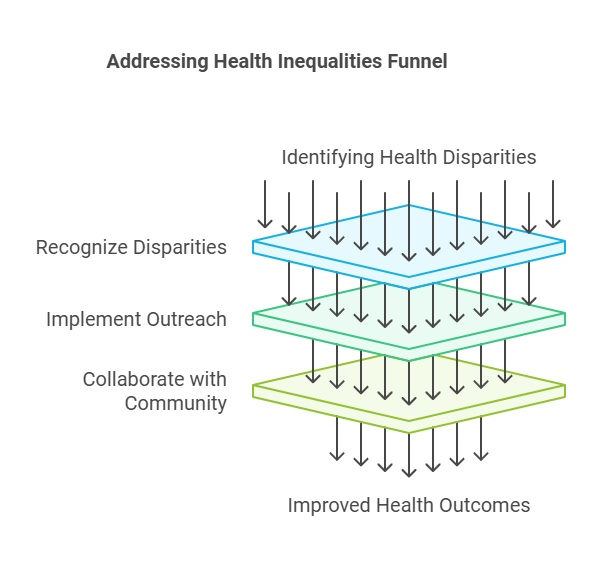
5. Promoting a Safe and Inclusive Environment
A safe, respectful, and inclusive healthcare environment is essential for both patients and staff.
- Zero Tolerance for Discrimination: Healthcare institutions enforce policies against racism, sexism, ageism, and other forms of discrimination.
- LGBTQ+ Inclusion: Health professionals create safe spaces for LGBTQ+ patients by using inclusive language, respecting preferred pronouns, and addressing unique healthcare needs.
- Workplace Equality: Promoting diversity in hiring practices ensures an inclusive workforce where different perspectives are valued.
For instance, many hospitals now implement LGBTQ+ health initiatives to address unique challenges faced by this community, including mental health concerns and access to preventative care.
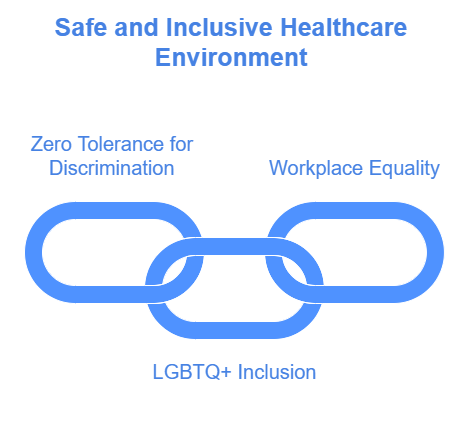
6. Listening to Patients and Encouraging Feedback
Health professionals encourage open communication with patients to better understand their experiences and needs.
- Patient-Centered Care: Providers tailor treatment plans based on individual needs, preferences, and cultural beliefs.
- Feedback Mechanisms: Hospitals create systems for patients to voice their concerns or experiences related to equality and inclusion.
- Continuous Improvement: Health professionals use feedback to adapt practices and improve healthcare services.
For example, a healthcare provider may conduct surveys or focus groups to gather insights into patients’ experiences and implement improvements to promote fairness and inclusivity.
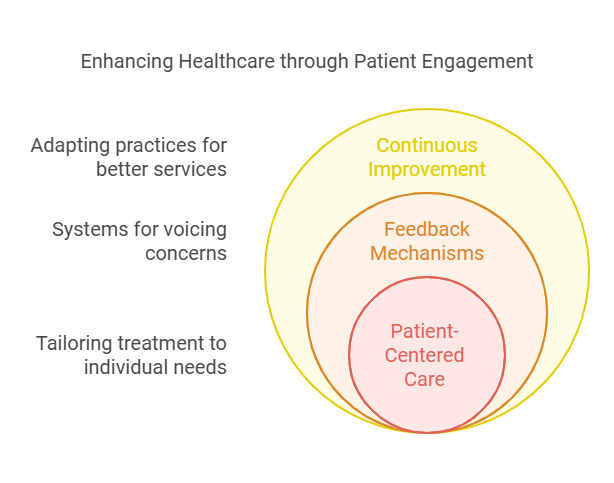
7. Advocating for Policy Changes
Health professionals often advocate for broader systemic changes to address inequality and promote diversity.
- Health Policy Advocacy: Professionals push for policies that reduce healthcare disparities, such as affordable healthcare initiatives or expanded mental health services.
- Public Awareness: Health professionals engage in public campaigns to highlight issues like racial disparities in healthcare outcomes.
- Collaboration with Governments: Healthcare leaders work alongside governments to implement equality-focused policies.
For example, many healthcare organizations advocate for policies that address social determinants of health, like poverty and education, which significantly impact health outcomes.
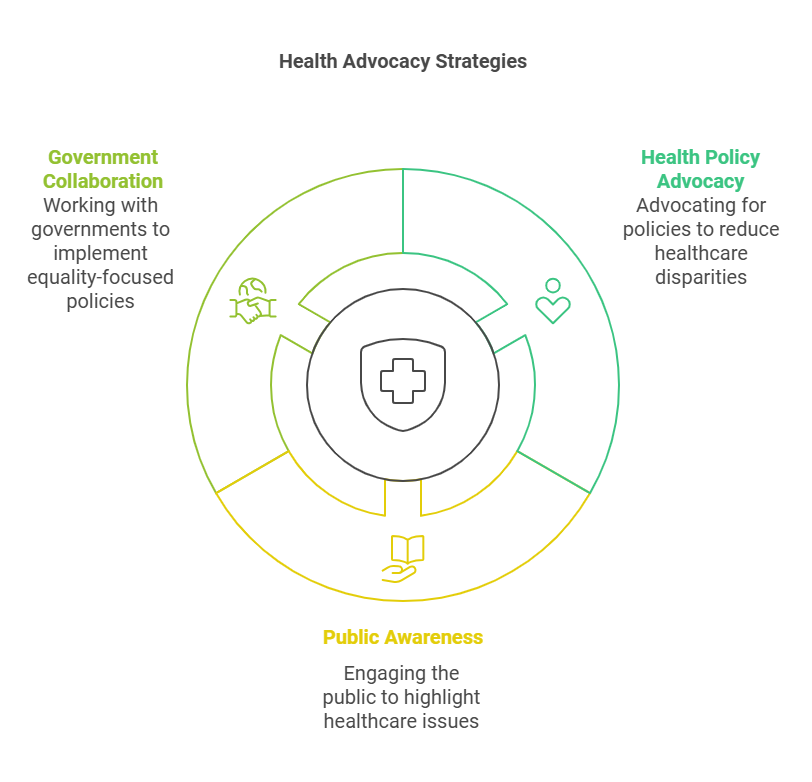
Challenges in Promoting Equality and Diversity
While health professionals work tirelessly to promote equality, they face several challenges, including:
- Resource Constraints: Limited funding and staffing can make it difficult to provide specialized services for diverse populations.
- Unconscious Bias: Despite training, healthcare workers may sometimes act on biases they are unaware of.
- Complex Health Needs: Diverse populations may have unique healthcare needs that require tailored approaches.
- Language and Communication Barriers: Limited access to interpreters can make it difficult to communicate effectively with non-native speakers.
Strategies for Overcoming Challenges
Health professionals and healthcare systems use several strategies to overcome these challenges:
- Investing in Training: Ongoing education on cultural competence and unconscious bias ensures health professionals remain aware and capable of addressing inequalities.
- Community Partnerships: Collaborating with local organizations helps address barriers and reach underserved populations.
- Data-Driven Solutions: Using data to track disparities helps healthcare providers design targeted interventions.
- Technology Integration: Tools like telehealth and translation apps improve accessibility for diverse populations.
Conclusion
Health professionals are at the forefront of promoting equality and diversity in healthcare. Through inclusive practices, cultural competence, ongoing education, and advocacy, they ensure that every patient receives fair, respectful, and tailored care. While challenges exist, continuous improvement and commitment to equality help create a healthcare system where everyone—regardless of their background—feels valued, respected, and supported. By prioritizing equality and diversity, health professionals contribute to healthier, more inclusive communities and better health outcomes for all.

“As the voice behind Radiant Glow Health, we are dedicated to being your ultimate wellness and vitality companion. Our mission is to inspire and guide you on your journey to a healthier and more vibrant life. Join us as we explore holistic health practices and empower you to radiate wellness from within.”



